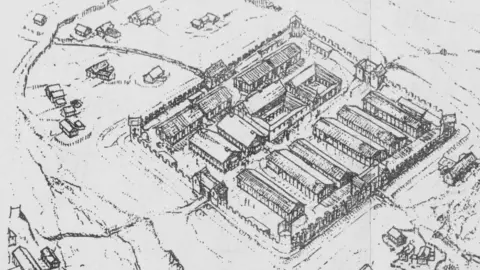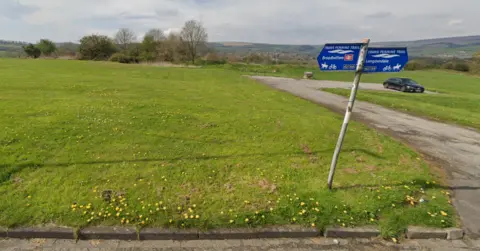Tale of ancient Roman fort to be unearthed
 Michael Harding Brown
Michael Harding BrownThe story of an ancient Roman fort in Derbyshire is being told for modern day visitors.
Melandra, in Gamesley, near Glossop, was once home to a garrison of 500 soldiers.
The stronghold was established in about 70AD as Rome intervened in a civil war among the Brigantes tribe and later occupied their territories across the north of England.
Since the 1960s, archaeologists have been unearthing the story of Melandra and for the first time, all of the research will be collected in one place for this year's Heritage Open Days.
Salford Archaeology will stage two exhibition and archaeology-themed arts and craft events at Glossop's Victoria Hall on Saturday and Tuesday.
Visitors will learn more about the history of Melandra, the archaeological research there, and handle Roman artefacts.
 National Highways
National HighwaysHeritage project manager Kate Spencer said: "Most excavations were carried out at the site in the 1960s, although excavations have been ongoing since the 1800s, resulting in the discovery of thousands of artefacts.
"These are currently scattered across the country in various museums, institutions and private collections. Until now we really didn't know what we had, and the collection is huge."
The fort was first built with wood to house a cohort of soldiers and was later rebuilt in stone in 108AD.
It eventually covered 3.5 acres, with military headquarters, barracks and a bathhouse.
 Google Streetview
Google StreetviewAmong the notable finds from the site is a mortarium - a bowl-shaped vessel used in the preparation of food, for mixing or grinding ingredients.
The piece, a relic which demonstrates the "Romanisation" of Britons, has the stamp of Vitalis, a pot maker based in the Warwickshire villages of Hartshill and Mancetter during the early 2nd Century.
Other discoveries giving a glimpse into daily life in Melandra include jewellery, statues of gods, leather sandals, gaming counters and dice.
Andy Dawson, project manager for National Highways, which has invested £133,500 in Melandra 2024 and reports into flooding, drainage, land slippage and masonry conservation at the site, said: "National Highways is not just about building roads.
"The Roman Legions were the most famous road builders of all, so it is appropriate we can support this educationally-important project, safeguarding the history of the area."
Follow BBC Derby on Facebook, on X, or on Instagram. Send your story ideas to [email protected] or via WhatsApp on 0808 100 2210.
